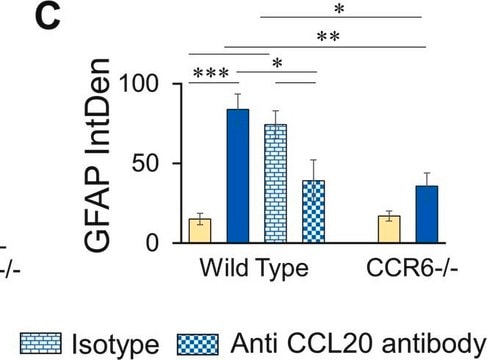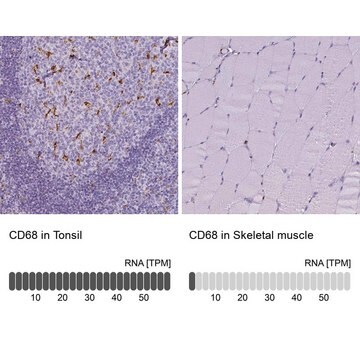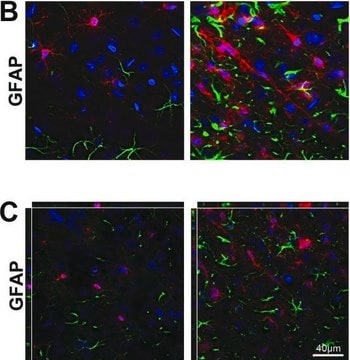AB5022
Anti-Taurine (No Gluteraldehyde) Antibody
diluted serum, Chemicon®
Faça loginpara ver os preços organizacionais e de contrato
About This Item
Código UNSPSC:
12352203
eCl@ss:
32160702
NACRES:
NA.41
Produtos recomendados
fonte biológica
rabbit
Nível de qualidade
forma do anticorpo
diluted serum
tipo de produto de anticorpo
primary antibodies
clone
polyclonal
reatividade de espécies
vertebrates
fabricante/nome comercial
Chemicon®
técnica(s)
immunohistochemistry: suitable
Condições de expedição
wet ice
modificação pós-traducional do alvo
unmodified
Especificidade
Taurine. The antibody has been calibrated against a spectrum of antigens to assure hapten selectivity and proper affinity. No measurable glutaraldehyde-fixed tissue cross-reactivity (<1:1000) against L-alanine, gamma-aminobutyrate, 1-amino-4-guanidobutane (AGB), D/L-arganine, D/L-aspartate, L-citrulline, L-cysteine, D/L-glutamate, D/L-glutamine, glutathione, glycine, L-lysine, L-ornithine, L-serine, L-threonine, L-tryptophan, L-tyrosine.
Imunogênio
Taurine-glutaraldehyde
Aplicação
Immunohistochemistry using silver-intensified immunogold or fluorescence (see recommended protocol). Samples should be fixed with 0.05% - 0.25% glutaraldehyde for optimum detection.
*This antibody has also been used and found to work with a zero-low glutaraldehyde / high paraformaldehyde fixation (4% paraformaldehyde in 0.1M phosphate buffer / 3% sucrose fixative ). The minimum glutaraldehyde concentration for AB5022 is 0.00%. See protocol that follows. Performance is good with frozen sections, Vibratome sections and tissue culture formats, when penetrating reagents such as 0.3% Triton X-100 are used.
Optimal working dilutions must be determined by the end user.
DILUTION: Prepare enough of the AB5022 for your days use by diluting 100X with 1% GSPBT.
*This antibody has also been used and found to work with a zero-low glutaraldehyde / high paraformaldehyde fixation (4% paraformaldehyde in 0.1M phosphate buffer / 3% sucrose fixative ). The minimum glutaraldehyde concentration for AB5022 is 0.00%. See protocol that follows. Performance is good with frozen sections, Vibratome sections and tissue culture formats, when penetrating reagents such as 0.3% Triton X-100 are used.
Optimal working dilutions must be determined by the end user.
DILUTION: Prepare enough of the AB5022 for your days use by diluting 100X with 1% GSPBT.
This Anti-Taurine (No Gluteraldehyde) Antibody is validated for use in IH for the detection of Taurine (No Gluteraldehyde).
forma física
IgG fraction in sterile 0.1M phosphate buffer. No preservative
Informações legais
CHEMICON is a registered trademark of Merck KGaA, Darmstadt, Germany
Não está encontrando o produto certo?
Experimente o nosso Ferramenta de seleção de produtos.
Frases de perigo
Declarações de precaução
Classificações de perigo
Aquatic Chronic 3
Código de classe de armazenamento
12 - Non Combustible Liquids
Classe de risco de água (WGK)
WGK 2
Ponto de fulgor (°C)
Not applicable
Certificados de análise (COA)
Busque Certificados de análise (COA) digitando o Número do Lote do produto. Os números de lote e remessa podem ser encontrados no rótulo de um produto após a palavra “Lot” ou “Batch”.
Já possui este produto?
Encontre a documentação dos produtos que você adquiriu recentemente na biblioteca de documentos.
Differential expression of synapsin in visual neurons of the locust Schistocerca gregaria.
Gerd Leitinger, Maria Anna Pabst, F Claire Rind, Peter J Simmons
The Journal of Comparative Neurology null
Yuanyuan Zhu et al.
Cellular and molecular neurobiology (2022-04-19)
Abnormal amino acid metabolism in neural cells is involved in the occurrence and development of major depressive disorder. Taurine is an important amino acid required for brain development. Here, microdialysis combined with metabonomic analysis revealed that the level of taurine
Lisa Nivison-Smith et al.
PloS one, 8(3), e58406-e58406 (2013-03-22)
Lampreys are one of the two surviving groups of the agnathan (jawless) stages in vertebrate evolution and are thus ideal candidates for elucidating the evolution of visual systems. This study investigated the retinal amino acid neurochemistry of the southern hemisphere
Nossa equipe de cientistas tem experiência em todas as áreas de pesquisa, incluindo Life Sciences, ciência de materiais, síntese química, cromatografia, química analítica e muitas outras.
Entre em contato com a assistência técnica








